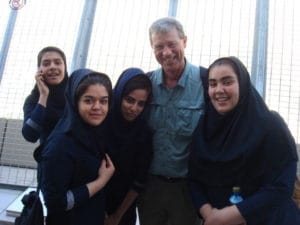1970s: Ping-Pong Diplomacy with China / 2014: Organic Diplomacy with Iran
Internationally respected organic leader, Jim Riddle, returned from Iran last week after participating in an international conference in the Middle East. Riddle, a former chairman of the National Organic Standards Board, and founder of an association of independent organic certifiers, is truly a statesman within the organic community and now international politics as well…

LaCrosse Tribune
by Nathan Hansen
WINONA, Minn. — After his recent trip to Iran, Winona County organic farmer Jim Riddle came back excited about his visit — and surprised with what he learned about the country and its culture.
Contrary to some public opinion, the country isn’t poor or backward, he said. It’s filled with modern cars and technology, blending with ancient cultures and traditions.
But none of those modern cars and technology come from the U.S., as our country and Iran have no formal diplomatic or trade relations. Instead, Riddle noted, it’s European, Asian and Australian companies that sell their products and have relations with a county of over 80 million people and a history stretching back millennia.
“The rest of the world is doing business there, and we’re not,” Riddle said. “Despite our recent history and what our two governments do and say, the people there still hold us in high regard.”
Riddle visited Iran earlier this month after he was invited to give a talk on U.S. organic market policy at an international Iran Organic Association conference. Along with his talk, he participated in a discussion panel at the end of the conference, where he discussed his experiences helping to develop organic markets in the U.S. in relation to Iran developing its own growing organic industry.
“They’re very passionate about organic,” Riddle said. “They’re well-organized. They have government support, university support and private-sector support. They really have the pieces in place to move forward.”
Despite a desire to get out and see the fields and the agricultural practices of the country, Riddle said he only got one opportunity when he visited a fig plantation. But he said he was amazed at the richness of democratic agriculture in the country, with elected organic leadership and a strong history of farmer’s cooperatives.
“I would have loved to get out into more fields,” he said. “I have to go back someday.”
Riddle did get some time for sightseeing in Tehran, the former capital city of Shiraz, and a visit to the ruined Persian capital of Persepolis. Along with visiting the former palace of the shah, Riddle experienced Tehran’s rich night-life, some of the country’s restaurants and bazaars, and was amazed at the integration of modern life and culture into the country’s traditions.
While women were required to cover their heads and segregation between the sexes still exists, Riddle said the women he encountered were inquisitive, friendly and didn’t face some of the restrictions of other Middle Eastern cultures. Riddle said they drove just as aggressively as the men on the roads and hold professions such as being a doctor or a journalist, and were just as interested to meet and speak with an American as the men.
“They were pretty brave,” Riddle said describing a visit to Milad Tower, where a group of visiting schoolgirls shook his hand and got a picture with him. “Women are not oppressed. They’re well-educated.”
While Americans were well-respected by everyone he encountered, Riddle said he only encountered three reminders of home: Coke, Pepsi and Apple products during his trip. And on the other side of the issue, several of Iran’s organic producers, like a tea farmer he met at the conference, have USDA organic certification and are just waiting for the day when trade between the U.S. and Iran can begin again.
“People just want to get along,” Riddle said. “And they have such a strong, deep history. It’s just a shame we don’t have normal relations with the country.”
Click here to see a photo gallery from Jim Riddle’s visit to Iran.

